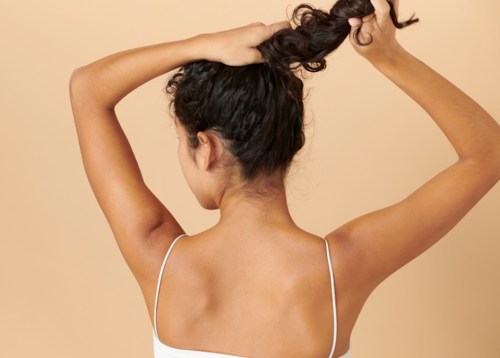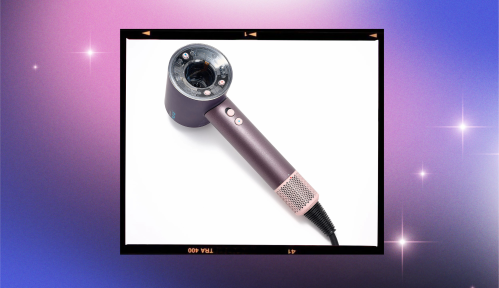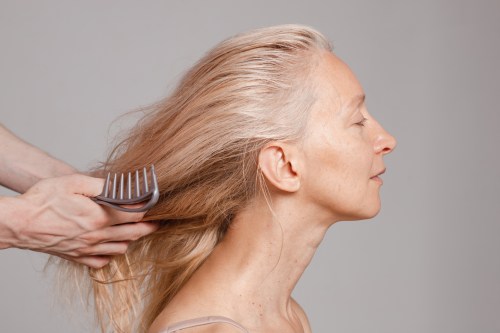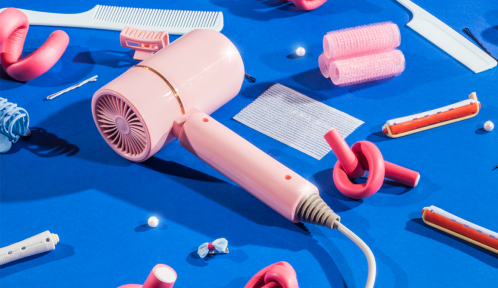Our editors independently select these products. Making a purchase through our links may earn Well+Good a commission
Here’s Exactly How Long It Takes To Grow Out Your Hair
Hair might grow up to half an inch monthly, and up to six inches a year. Learn how factors like health and hormones affect growth.

IDK about you, but time has been flying. Hours feel like minutes, and minutes feel like dust. The rapid shift in time applies to almost everything in life—except our hair.
Experts in This Article
trichologist, hair expert, and CEO of Colour Collective
board-certified dermatologist at Dermatology Physicians of Connecticut and associate clinical professor in dermatology at Yale School of Medicine
If you recently made a chop you regret, are in the throes of growing out your bangs, or are dealing with temporary hair loss, growing out your hair can feel like a forever (and super slow) process. You may be looking at your hair daily, evaluating every teeny detail, just waiting for the next inch to creep through, wondering: how fast does hair grow?
The short answer is: it’s complicated and requires some patience. To help us better understand hair growth cycles, we tapped board-certified dermatologist Mona Gohara, MD, and Kerry E. Yates, trichologist and founder of Colour Collective, for everything you need to know about hair growth.
What are the phases of hair growth?
There are four phases of hair growth: the anagen phase (the growth cycle), the catagen phase (the transition), the telogen phase (the rest stage), and the exogen phase (the shedding stage). Each of the phases has their own timeline, but they are also affected by age, overall health, and nutrition, explains Kerry E. Yates, Trichologist and founder of Colour Collective. Everyone’s hair goes through these phases, and there’s truly no way to hack the system.
Anagen Phase
The anagen phase is the longest phase, lasting around five years. During this phase, the hair follicle pushes out hairs that will continue to grow until they fall out. According to Dr. Gohara, around 90% of hairs are in this phase at any given time.
Catagen Phase
The catagen phase lasts about 10 days, when hair follicles shrink and the hair growth slows down.
Telogen Phase
The telogen phase, also known as the resting phase, lasts about three months. During this phase, hairs don’t grow (but they don’t usually fall out, either), and new hairs start to form in follicles that have just released hairs during the catagen phase.
Exogen Phase
The exogen phase is when your hair sheds (typically up to 100 hairs per day). Washing and brushing your hair can also amplify this stage.
What affects hair growth?
While the strands of your hair that you see are actually dead (yes, really), they start as living cells nourished by blood vessels and nerves. This is why, like the rest of your body, your overall health and age all affect how your hair grows.
Hormones
Hair growth is closely tied to your hormones, so any fluctuation in them can affect how much your hair grows and how thick they are. For example, most people might experience fuller, longer hair during pregnancy (when hormones are changing) and postpartum shedding or hair loss when hormones are fluctuating after birth.
Stress
Too much stress can lead to telogen effluvium, which is a condition where the follicles are prematurely pushed into the resting phase, causing extra hair loss.
Medications
According to Dr. Gohara, certain medications, like antidepressants, birth control, and oral acne medication can also affect hair growth and loss. If you’re concerned about hair loss and taking any of these types of medication, definitely reach out to your doctor who can help get to the root of your concern.
How can you speed up hair growth?
We know for sure that you can’t change the number of hair follicles on your head, but the jury is still out on whether you can actually speed up your hair growth. That said, if your body is lacking certain nutrients, your hair could be growing slower than normal, in which case you could possibly speed up your hair growth. If you’re concerned with any deficiencies, talk to your doctor about getting your blood examined to determine what you need to supplement with.
But no matter what, ensuring you’re eating a well-rounded diet never hurts. “Lean protein, plant-based food intake with a lot of cruciferous greens, and healthy fats in nuts and avocados are the best for all organ health, including hair, skin, and nails,” says Dr. Gohara.
How fast does hair grow per month?
Don’t hold your breath if you’re looking to grow your hair out in a month. According to Yates, hair typically grows .5 to 1.7 centimeters per month, but you may see about six inches per year. Again, remember that many factors contribute to hair growth, and everyone is different—so these numbers are just general.
Does hair stop growing at a certain age?
Your hair doesn’t stop growing at any particular age. However, “we typically see that when people hit around age 50, their hair growth tends to be a lot slower,” Yates explains. This is typically reflective of hormonal shifts that are also occurring at the same time, such as menopause.
Does hair have a maximum length?
Usually, the maximum length for hair growth is two or three feet, but there isn’t a fixed maximum length for everyone. Ultimately, this is determined by genetics and other factors like overall health and hormones.
Final takeaway
Ultimately, there are a lot of nuances when it comes to how fast and how long everyone’s hair grows and, generally, the process is slow. Knowing the different phases of hair growth can help better manage your expectations, while also helping you identify signs of hair loss if it’s something you’re dealing with. Your hormones, genetics, and overall health can all impact how fast your hair grows. So, worry not if your bob hasn’t turned into a ponytail overnight—it’s completely normal. And, hey, if you want to extend your lengths immediately, there are definitely a ton of temporary quick fixes (thank you, extensions).
Sign Up for Our Daily Newsletter
Get all the latest in wellness, trends, food, fitness, beauty, and more delivered right to your inbox.
Got it, you've been added to our email list.










